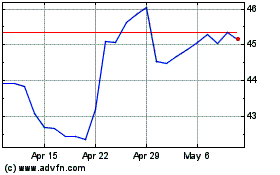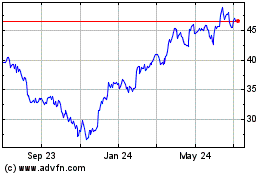Brazil Willing To Negotiate Changes In Higher Auto Import Tax
October 11 2011 - 5:43PM
Dow Jones News
Brazil has agreed to negotiate changes in a higher tax on car
imports to accommodate auto makers that have disclosed billions of
dollars in new investments in the world's fourth-largest vehicle
market, but critics of the higher tax say the damage to
competition, and the consumer, has already been done.
Last month, Brazil raised what is known as the IPI tax on cars
by 30 percentage points, but exempted locally produced cars in a
move seen as a way to protect long-established auto companies
buffeted by a wave of imports that have flooded the market. Car
makers that are building factories in Brazil protested the higher
tax, however, because they say they won't be able to immediately
meet local-content requirements and so would still have to pay the
tax.
Brazil's Trade Ministry now said it is willing to negotiate with
companies that are moving production onshore, gradually stepping up
local-content requirements to the stipulated 65% in order to give
the new companies time to find adequate local suppliers. These
changes will be negotiated with each company individually, as the
government won't change the executive decree that raised the IPI,
the ministry's press office said Tuesday.
Newcomers to Brazil have been consistently eroding the market
share of Volkswagen AG (VOW.XE, VLKAY), Fiat SpA (F.MI, FIATY),
General Motors Co. (GM) and Ford Motor Co. (F), which together
account for about 75% of Brazil's vehicle sales. Imports now
account for about 20% of sales, though most of those imports are
from factories of the "big four" in Mexico or in Mercosul trade
partners, all of which are exempt from the higher tax.
"In the short term, the government tried to defend the big
players and the consumer came out a loser," said Tereza Fernandez,
auto analyst at consulting firm MB Associados. "Those new companies
that are coming are still coming, so it doesn't change anything. My
doubt is whether the big companies once again don't do anything in
the meantime."
The higher tax, in effect since Sept. 15, has already roiled car
sales and is expected to depress already-slowing growth even
further, according to Jose Luiz Gandini, president of Kia Motors
Corp.'s (000270.SE) Brazilian unit and head of auto importer
association Abeiva.
Auto sales have slowed this year as the government moved to curb
new credit, and will likely end the year with an expansion of 5%,
from growth of 12% in 2010. September sales suffered further as
consumers and dealers, hopeful the government would reverse the
higher tax, held off on purchases in recent weeks, Gandini
said.
Gandini said Kia, along with rival importers, will eventually
pass on the higher tax rate to consumers, crimping future demand.
He expects locally based carmakers exempt from the tax will raise
prices as well in order to recoup profitability.
Yet a deficit in local production means massive imports will
have to continue for at least the next four years, according to
Morgan Stanley. Production plans in the country are still lagging
the expected increase in sales through 2014, when vehicle purchases
are set to top four million, from 3.5 million at the end of last
year.
The higher tax expires at the end of 2012--the short duration
means Brazil is unlikely to see challenges to the protectionist
measure at the World Trade Organization, analysts said--but nothing
impedes the government from extending it.
Meanwhile, car imports have helped to stabilize prices in a
market where the big four had vast pricing power, according to
Roberto Marx, a professor of production engineering at Sao Paulo
University and Fundacao Vanzolini.
In addition to helping keep prices relatively stable, imports
have played another important role by introducing new technology to
the nation's cars, Marx said. Though the government also requires
research-and-development investment for companies to be exempt from
the higher tax, it isn't enough, he said.
"More important than having auto makers here is having auto
makers that produce up-to-date cars, with more value added," he
said. "The higher IPI means that cars produced locally, on average,
are less advanced than those coming in from outside."
The higher tax hasn't yet scared off new car makers. Chinese car
maker Chery Automobile Co. is going ahead with construction on its
plant, and Anhui Jianghuai Automobile Co. (600418.SH) said last
week it still wants to build a factory in Brazil's northeastern
state of Bahia. South Korea's Hyundai Motor Co. (005380.SE, HYMLY)
likewise has continued work on its new plant, and Japan's Nissan
Motor Co. (7201.TO, NSANY) said last week it would invest $1.5
billion in a new factory.
"We're investing for the next 20 [to] 30 years, and we have no
doubt that what we're doing is correct," said Carlos Ghosn, chief
executive of French-Japanese automotive alliance Renault-Nissan
after disclosing a $266 million investment by Renault (RNO.FR) last
week.
-By Paulo Winterstein, Dow Jones Newswires; 55-11-3544-7073;
paulo.winterstein@dowjones.com
General Motors (NYSE:GM)
Historical Stock Chart
From Mar 2024 to Apr 2024

General Motors (NYSE:GM)
Historical Stock Chart
From Apr 2023 to Apr 2024
